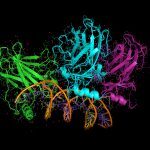Link to Pubmed [PMID] – 31157165
Link to DOI – 38010.3389/fonc.2019.00380
Front Oncol 2019 ; 9(): 380
Decades of research have disclosed a plethora of alterations in protein glycosylation that decisively impact in all stages of disease and ultimately contribute to more aggressive cell phenotypes. The biosynthesis of cancer-associated glycans and its reflection in the glycoproteome is driven by microenvironmental cues and these events act synergistically toward disease evolution. Such intricate crosstalk provides the molecular foundations for the activation of relevant oncogenic pathways and leads to functional alterations driving invasion and disease dissemination. However, it also provides an important source of relevant glyco(neo)epitopes holding tremendous potential for clinical intervention. Therefore, we highlight the transversal nature of glycans throughout the currently accepted cancer hallmarks, with emphasis on the crosstalk between glycans and the tumor microenvironment stromal components. Focus is also set on the pressing need to include glycans and glycoconjugates in comprehensive panomics models envisaging molecular-based precision medicine capable of improving patient care. We foresee that this may provide the necessary rationale for more comprehensive studies and molecular-based intervention.


